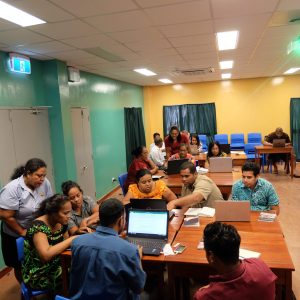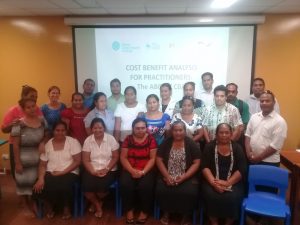Starting on September 7-12, 2018, the Global Green Growth Institute (GGGI) with support from the SPC/GIZ Coping with Climate Change in the Pacific Island Region (CCCPIR) program and the Ministry of Finance and Economic Development began a four-day Cost-Benefit Analysis Training Workshop, building on previous experiences on CBA trainings in Kiribati.
This four-day training was aimed at deepening skills in Cost Benefit Analysis as a practical tool to support government officials in the Ministry of Environment, Land and Agriculture (MELAD), the Ministry of Finance and Economic Development (MFED) and the Office of the President (OB) to identify and assess green and climate resilient projects.

Workshop participants practicing cost-benefit analysis techniques.
Government officials from MFED provided participants with invaluable information on internal proposal development procedures and the linkages between the development of CBAs and their internal budget processes as well.
The meeting was attended by thirty government officers from MELAD, MFED, the Climate Change and Disaster Risk Management Division from the OB as well as observers from the Ministry of Information, Communications, Transport and Tourism Development (MICTT).

Workshop participants group photo.
The Global Green Growth Institute is a treaty-based international, inter-governmental organization dedicated to supporting and promoting strong, inclusive and sustainable economic growth in developing and emerging economies. GGGI envisions a resilient world achieved through strong, inclusive and sustainable green growth, and is dedicated to supporting the transition of GGGI Member countries toward a green growth model. www.gggi.org
About SPC/GIZ CCCPIR: The SPC/GIZ Coping with Climate Change in the Pacific Island Region (CCCPIR) program since 2011 aims to improve climate resilience and climate protection in Pacific ACP countries. It does so through a multi-level approach (regional, national, and local), co-implementing with the Pacific Community (SPC) and in close collaboration with the Pacific Islands Forum Secretariat (PIFS) and the